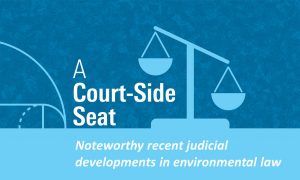This is a review of initial Supreme Court and Federal Appeals Courts oral arguments and other matters in October 2022.
Articles Posted in Environmental
Proposed Rule to Designate Two PFAS Chemicals as Hazardous Substances Stands to Up the Ante for Site Remediation
On Friday, August 26, 2022, the U.S. Environmental Protection Agency (EPA) released a pre-publication notice of a long-awaited proposed rule to designate two of the most-studied per- and polyfluoroalkyl substances (PFAS)—perfluorooctanoic acid (PFOA) and perfluorooctanesulfonic acid (PFOS)—as hazardous substances under the Comprehensive Environmental Response, Compensation, and Liability Act (CERCLA). In an accompanying statement, EPA indicated that the proposed rule will be published in the Federal Register within the next few weeks. That publication will commence a 60-day public comment period, and EPA appears to be targeting final rule promulgation by Summer 2023. The addition of PFOA and PFOS to the hazardous substances list may significantly expand CERCLA liability, thus increasing the number of responsible parties, expanding investigatory costs and duration, remediation, and where applicable, natural resource damages liability.
Click here to read the full client alert from Pillsbury’s Reza Zarghamee, Amanda Halter, Mark Plumer, and Ashleigh Myers
Real Estate & Construction News Round-Up (09/07/22) – Futuristic Cities, Shifting Housing Demand, and Rent Control
This week’s round-up addresses the shift in housing demand, efforts of apartment complexes to become more eco-friendly, plans for “cities of the future,” and more.
The Administrative Procedure Act and the Evolution of Environmental Law
Enacted in 1946, the Administrative Procedure Act (APA) has provided a lasting framework for federal agency rulemaking and adjudication, as well as establishing the power of the federal courts to exercise judicial review over these actions of the federal bureaucracy. The APA is codified at 5 U.S.C. §§ 551–559, and §§ 701-706. There have been very few amendments made to the APA over these years, which indicates that Congress is reasonably satisfied with its administration and implementation.
A Potential Crypto Mining Moratorium in New York
In “New York Legislature Passes Moratorium on Crypto Mining Operations” on our Internet & Social Media Law blog, Brian H. Montgomery discusses recently passed cryptocurrency mining legislation and its potential signing by Gov. Kathy Hochul.
Superfund Chemical Taxes Reinstated
Section 80201 of the Infrastructure Investment and Jobs Act of 2021, Public Law 117-58, reinstates the long-expired federal excise taxes that are imposed on specified chemical substances used in common industrial applications pursuant to Sections 4661 and 4671 of the Internal Revenue Code. The effective date of this reinstatement is July 1, 2022, and these taxes expire on December 31, 2031. The Act “decoupled” these reinstated chemical taxes from the now-expired Superfund petroleum excise tax that also funded the Superfund Hazardous Substance Response Trust Fund, which was created when Superfund (formally known as the Comprehensive Environmental Response Compensation and Liability Act, or CERCLA) was enacted in 1980. The Secretary of the Treasury was directed to publish an initial list of taxable chemicals by January 1, 2022, and this initial list was set forth in IRS Notice 2021-66. The list contains not only the 50 taxable chemical substances listed in Section 4672 (a)(3) of the Internal Revenue Code but also the 101 taxable chemicals listed in this Notice. In addition, Section 80201 of the Act also modified the existing tax rates by raising them.
Real Estate & Construction News Round-Up (05/11/22)
The supply of homes for sale is on the uptick, the White House releases a plan to improve the permitting process for infrastructure projects, cryptocurrency opens the door to a new class of property owners, and more.
Developments in Energy and Environmental Regulation: The View From Austin
Pillsbury’s Anne Idsal Austin moderated a Federal Bar Association (Houston Chapter) panel discussion with Erin Chancellor, Director of Legal Services at the Texas Commission on Environmental Quality (TCEQ), and Sam Gammage, General Counsel of the Texas Chemical Council (TCC), on Monday, April 18. The panelists brought to bear their regulatory, legislative, and legal expertise to discuss EPA’s increased emphasis on environmental justice (EJ) and Title VI, the TCEQ’s proposed compliance history rule, and the upcoming Sunset Review of the TCEQ
Real Estate & Construction News Round-Up 04/13/22
Phishing schemes target the mortgage industry, housing prices rise in Europe as Ukrainian refugees flee from their home country, the SEC announces new climate change regulations that will impact commercial real estate, and more.
NEPA’s Evolution During the Biden Administration
As our readers know, any construction project associated with a federal agency such as the Department of Transportation or Federal Transit Administration must comply with the requirements of the National Environmental Policy Act (NEPA). In Quicker But Less Dirty: The Biden Administration Both Streamlines and Seeks to Expand NEPA Environmental Review, written for the ABA Construction Forum’s Construction Lawyer journal, colleague Elaine Y. Lee provided a high-level overview of NEPA, its origins and current framework, criticisms, and prior administrations’ attempts to reform the law, before proceeding to examine two sets of changes to NEPA proposed by the Biden Administration that are arguably diametrically opposed.
 Gravel2Gavel Construction & Real Estate Law Blog
Gravel2Gavel Construction & Real Estate Law Blog



